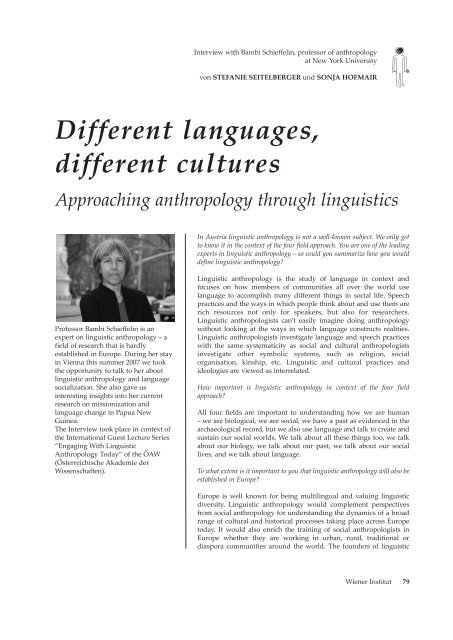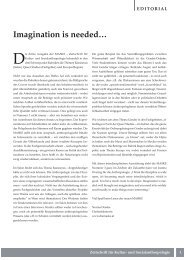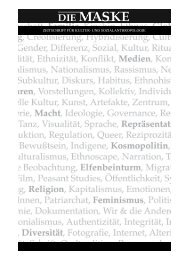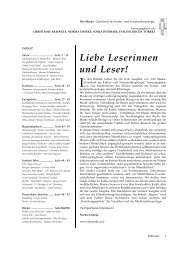Anthropology goes public! - Die Maske
Anthropology goes public! - Die Maske
Anthropology goes public! - Die Maske
Erfolgreiche ePaper selbst erstellen
Machen Sie aus Ihren PDF Publikationen ein blätterbares Flipbook mit unserer einzigartigen Google optimierten e-Paper Software.
Interview with Bambi Schieffelin, professor of anthropology<br />
at New York University<br />
von STEFANIE SEITELBERGER und SONJA HOFMAIR<br />
Different languages,<br />
different cultures<br />
Approaching anthropology through linguistics<br />
Professor Bambi Schieffelin is an<br />
expert on linguistic anthropology – a<br />
field of research that is hardly<br />
established in Europe. During her stay<br />
in Vienna this summer 2007 we took<br />
the opportunity to talk to her about<br />
linguistic anthropology and language<br />
socialization. She also gave us<br />
interesting insights into her current<br />
research on missionization and<br />
language change in Papua New<br />
Guinea.<br />
The Interview took place in context of<br />
the International Guest Lecture Series<br />
“Engaging With Linguistic<br />
<strong>Anthropology</strong> Today” of the ÖAW<br />
(Österreichische Akademie der<br />
Wissenschaften).<br />
In Austria linguistic anthropology is not a well-known subject. We only get<br />
to know it in the context of the four field approach. You are one of the leading<br />
experts in linguistic anthropology – so could you summarize how you would<br />
define linguistic anthropology?<br />
Linguistic anthropology is the study of language in context and<br />
focuses on how members of communities all over the world use<br />
language to accomplish many different things in social life. Speech<br />
practices and the ways in which people think about and use them are<br />
rich resources not only for speakers, but also for researchers.<br />
Linguistic anthropologists can’t easily imagine doing anthropology<br />
without looking at the ways in which language constructs realities.<br />
Linguistic anthropologists investigate language and speech practices<br />
with the same systematicity as social and cultural anthropologists<br />
investigate other symbolic systems, such as religion, social<br />
organisation, kinship, etc. Linguistic and cultural practices and<br />
ideologies are viewed as interrelated.<br />
How important is linguistic anthropology in context of the four field<br />
approach?<br />
All four fields are important to understanding how we are human<br />
– we are biological, we are social, we have a past as evidenced in the<br />
archaeological record, but we also use language and talk to create and<br />
sustain our social worlds. We talk about all these things too, we talk<br />
about our biology, we talk about our past, we talk about our social<br />
lives, and we talk about language.<br />
To what extent is it important to you that linguistic anthropology will also be<br />
established in Europe?<br />
Europe is well known for being multilingual and valuing linguistic<br />
diversity. Linguistic anthropology would complement perspectives<br />
from social anthropology for understanding the dynamics of a broad<br />
range of cultural and historical processes taking place across Europe<br />
today. It would also enrich the training of social anthropologists in<br />
Europe whether they are working in urban, rural, traditional or<br />
diaspora communities around the world. The founders of linguistic<br />
Wiener Institut<br />
79





